
The brown hairstreak is a butterfly in the family Lycaenidae. The range includes most of the Palaearctic.

The black hairstreak is a butterfly in the family Lycaenidae.

Acraea terpsicore, the tawny coster, is a small, 53–64 millimetres (2.1–2.5 in), leathery-winged butterfly common in grassland and scrub habitats. It belongs to the Nymphalidae or brush-footed butterfly family. It has a weak fluttery flight. It is avoided by most insect predators. This species and the yellow coster are the only two Indian representatives of the predominantly African tribe Acraeini. It is found in India, Sri Lanka, Indonesia, Maldives to Myanmar, Thailand, Laos, Cambodia, Vietnam, Bangladesh, Malaysia, Singapore, and recently Australia.

Delias eucharis, the common Jezebel, is a medium-sized pierid butterfly found in many areas of south and southeast Asia, especially in the non-arid regions of India, Bangladesh, Sri Lanka, Indonesia, Myanmar and Thailand. The common Jezebel is one of the most common of the approximately 225 described species in the genus Delias.
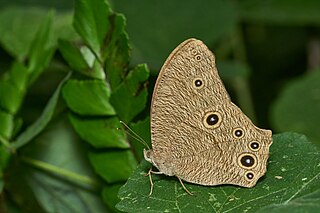
Melanitis leda, the common evening brown, is a common species of butterfly found flying at dusk. The flight of this species is erratic. They are found in Africa, South Asia and South-east Asia extending to parts of Australia.
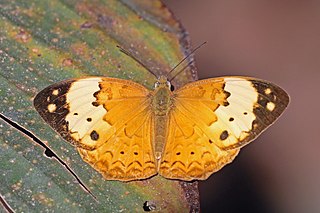
Cupha erymanthis, the rustic, is a species of brush-footed butterfly found in forested areas of tropical South Asia and Southeast Asia. The males and females are identical.
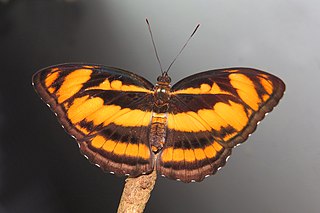
Athyma nefte, the colour sergeant, is a species of brush-footed butterfly found in tropical South and Southeast Asia.

Deudorix epijarbas, the cornelian or hairy line blue, is a species of lycaenid or blue butterfly found in south and southeast Asia from India to Fiji, including the Philippines, and also the tropical coast of Queensland in Australia. The species was first described by Frederic Moore in 1857.

Callicore is a genus of nymphalid butterfly found in the Neotropical realm. This genus, like some related ones, was formerly lumped together as the paraphyletic Catagramma assemblage.
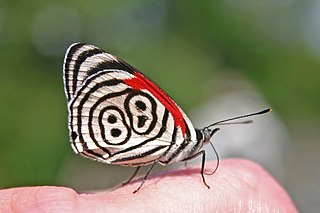
Diaethria is a brush-footed butterfly genus found in the Neotropical realm, ranging from Mexico to Paraguay.

Chlosyne lacinia, the bordered patch or sunflower patch, is a North and South American butterfly in the family Nymphalidae.

Hamadryas laodamia, the starry night cracker or starry cracker, is a species of cracker butterfly in the family Nymphalidae. It can be found from Mexico to the Amazon basin, but is most common in lowland forest in the Caribbean area.

Diaethria astala, the faded eighty-eight or navy eighty-eight, is a species of butterfly of the family Nymphalidae. It is found from Mexico to Colombia.
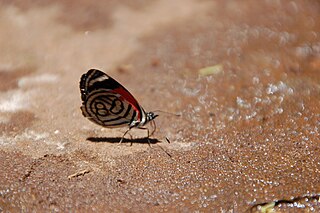
Diaethria candrena, the candrena eighty-eight or number eighty, is a species of butterfly of the family Nymphalidae. It is found in Argentina and Brazil.
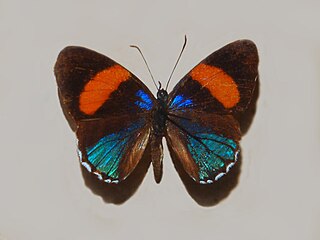
Callicore hydaspes, the Hydaspes eighty-eight or little callicore, is a species of butterfly of the family Nymphalidae.
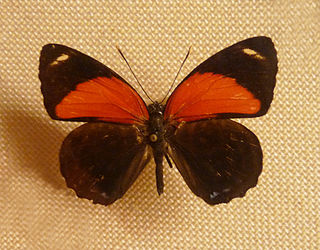
Catagramma pygas, the Godart's numberwing or pygas eighty-eight, is a species of butterfly of the family Nymphalidae. It is found in Venezuela, Guyana, Ecuador, Peru, Bolivia, Paraguay and the upper Amazonian region of Brazil.
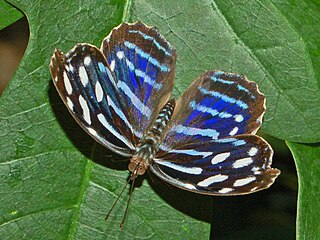
Myscelia cyaniris, the blue wave, blue-banded purplewing, tropical blue wave, whitened bluewing, or royal blue, is a butterfly of the family Nymphalidae.
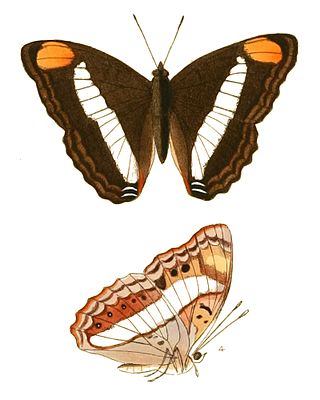
Doxocopa pavon, the Pavon emperor or Pavon, is a species of butterfly in the family Nymphalidae. They can be found from Paraguay in South America up to Texas in the southern United States. They are generally brown in their overall coloration, with two bands of white straddling the middle of the upper surfaces of the wings, and a patch of orange on the tips of their forewings. The upper surfaces of the wings of the males are overlaid by an iridescent blue-purple sheen. The females of the species closely resemble members of the unrelated genus Adelpha.

Diaethria neglecta is a species of butterfly of the genus Diaethria. It was described by Osbert Salvin in 1869. It is found in Bolivia, Peru, Ecuador, Colombia and Venezuela. All Diaethria species are commonly called eighty-eights because of the patterns on the hindwing undersides.

Smyrna blomfildia, the Blomfild's beauty, is a species of butterfly in the family Nymphalidae.




















